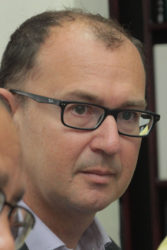An audit of the procurement process in the health sector is being funded and led by the Pan-American Health Organization/ World Health Organization (PAHO/ WHO), the Public Health Ministry announced yesterday.
A press statement from the Ministry of Public Health (MOPH) said the audit will be spearheaded by Professor Jaime Espin Balbino of the Andalusian School of Public Health, Regional Ministry of Health and it is expected to target the operations of both the ministry and the Georgetown Public Hospital Corporation (GPHC).

The audit follows complaints about the quality of drugs being sourced and allegations of orchestrated shortages of both drugs and medical supplies in the government-run sector.
Lawrence has also found herself at the centre of a procurement controversy in relation to the purchases of $605M in drugs for the GPHC without the approval of the National Procurement and Tender Administration Board. This matter is being investigated by the Public Procurement Commission.
According to the ministry’s statement, Lawrence noted that the audit into how things are currently done and the specific changes that will be implemented will provide the roadmap for the future to remove the “vast deficiencies in knowledge and manpower” which currently hamstring the MOPH and the GPHC.
“I found that it (the procurement process) was a bigger issue than I thought,” she was quoted as saying during a meeting yesterday with the audit team. “I didn’t think it was as bad as I found it (but) this is the beginning of the process of regularising operations in the wider health sector,” she added.
Lawrence said that the audit is not intended to harass those with responsibility in the sector’s procurement process “but to correct the system.”
This position was supported by Dr Karen Cummings, Minister within the Public Health Ministry who called for the procurement process to be demystified.
“There is something wrong somewhere,” Cummings observed.
Already Chief Medical Officer (CMO) Dr. Shamdeo Persaud, PAHO/WHO’s Health System and Services (HSS) Advisor Dr. Paul Edwards and professor Balbino have identified several hurdles which need to be overcome.
The statement said the trio reportedly identified managerial and policy shortcomings, non-implementation of plans of action crafted by the MOPH, a paucity of information from the public health sector and shortage and hoarding of medication by patients nationwide.
The statement noted that Dr. Edwards expressed confidence that Balbino is “the right person for the job” as he has a wide range of experience in the field having done similar work in Europe and Latin America.
Describing the audit as a daunting process which would require several consultancies, he cautioned GPHC authorities not to expect immediate results following the audit, its recommendations and implementation.
“It’s not going to be accomplished overnight,” Edwards said, while referring to the lengthy time it has taken other countries to get positive results.
Additionally, Balbino noted that political will must be complemented by the appropriate financial backing and competent human resources. “You are doing well (but) you can improve,” he told the MOPH and GPHC teams before adding that managers of the Guyanese public health sector must continue thinking long-term but remember that “more data, better advice”.





